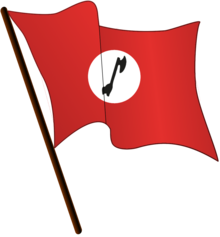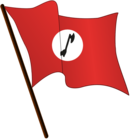| Revision as of 12:55, 6 September 2023 editEnchantedEdits (talk | contribs)160 editsNo edit summaryTags: Mobile edit Mobile web edit← Previous edit | Revision as of 12:09, 15 September 2023 edit undoStarkex (talk | contribs)Extended confirmed users1,711 editsmNo edit summaryTag: Visual editNext edit → | ||
| Line 2: | Line 2: | ||
| {{See also|Sindhudesh}} | {{See also|Sindhudesh}} | ||
| ] | ] | ||
| '''Sindhi nationalism''' ({{Lang-sd|{{Lang|sd|{{Naskh|سنڌي قومپرستي}} |
'''Sindhi nationalism''' ({{Lang-sd|{{Lang|sd|{{Naskh|سنڌي قومپرستي}}}}}}) is an ideology that claims that the ], an ethnolinguistic group native to the ] of ], form a separate nation. After ] ] in 1971, ] gave a new direction to nationalism and founded the ] in 1972 and presented the idea of ]; a separate homeland for ].<ref name="Dawn">{{cite web|title=Analysis: Sindhi nationalists stand divided|url=http://www.dawn.com/news/1148698|website=DAWN.COM|access-date=9 February 2017|language=en|date=4 December 2014}}</ref> G.M. Syed is considered as the founder of modern Sindhi nationalism.<ref name="Dawn2">{{cite web|title=Making of the Sindhi identity: From Shah Latif to GM Syed to Bhutto|url=http://www.dawn.com/news/1205900|website=DAWN.COM|access-date=9 February 2017|language=en|date=10 September 2015}}</ref> However, Sindhi nationalists stand divided upon the idea of a separate country or autonomy within Pakistan.<ref>{{Cite web|last=Sangi|first=Sohail|date=2014-12-04|title=Analysis: Sindhi nationalists stand divided|url=http://www.dawn.com/news/1148698|access-date=2021-04-30|website=DAWN.COM|language=en}}</ref> | ||
| ==Total Independence of Sindh== | ==Total Independence of Sindh== | ||
Revision as of 12:09, 15 September 2023
Ideology asserting that the Sindhs are a distinct nation See also: Sindhudesh
Sindhi nationalism (Template:Lang-sd) is an ideology that claims that the Sindhis, an ethnolinguistic group native to the Pakistani province of Sindh, form a separate nation. After Bangladesh became independent in 1971, G.M. Syed gave a new direction to nationalism and founded the Jeay Sindh Mahaz in 1972 and presented the idea of Sindhudesh; a separate homeland for Sindhis. G.M. Syed is considered as the founder of modern Sindhi nationalism. However, Sindhi nationalists stand divided upon the idea of a separate country or autonomy within Pakistan.
Total Independence of Sindh
See also: SindhudeshThe Sindhi nationalist movement's demands ranged from greater cultural, economic and political rights, to political autonomy, and to outright secession from Pakistan and the creation of an independent state referred to as Sindhudesh. It was founded by G. M. Syed in 1972 to separate Sindh from Pakistan. Sindhi separatists believe that the Sindhi people suffer from disenfranchisement at the hands of Pakistan's Punjabi majority. In 1972 G.M Syed, The considered founder of Sindhi nationalism formed an organization Jeay Sindh Mahaz. Later JSM divided into many fictions. Majorly two of these various political counterparts of Sindhi nationalism are JSQM and JSMM which believe in the political struggle
Militant acts
Sindhi nationalists Sindhudesh Liberation Army is a militant organization of Sindhi nationalist parties in Sindh. The Sindhudesh Liberation Army became publicly known during the 2010, after it claimed bomb blast on railway tracks near Hyderabad, Pakistan. In October 2012, Sindhudesh Liberation Army was designated as terrorist organisation by the Government of Pakistan.
Rights for Sindh according to 1940 Resolution
In Sindh province many nationalist parties other than these separatist nationalist parties have been demanding for the rights of Sindhi people according to the 1940 Lahore resolution within the framework of Pakistan, it was demanded that Sindhis be given a separate state. Major parties those advocate this rhetoric are Awami Tehreek led by Rasool Bux Palijo; formerly worked with G.M. Syed but parted his ways after the Syed's call for a separate homeland for Sindhis. Sindh United Party led by G.M. Syed's grandson Syed Jalal Mehmood Shah and Sindh Taraqi Pasand Party led by Qadir Magsi.
Political parties
- Jeay Sindh Qaumi Mahaz
- Sindh National Front
- Sindh United Party
- Sindh Taraqi Pasand Party
- Awami Tahreek
See also
References
- ^ "Analysis: Sindhi nationalists stand divided". DAWN.COM. 4 December 2014. Retrieved 9 February 2017.
- "Making of the Sindhi identity: From Shah Latif to GM Syed to Bhutto". DAWN.COM. 10 September 2015. Retrieved 9 February 2017.
- Sangi, Sohail (2014-12-04). "Analysis: Sindhi nationalists stand divided". DAWN.COM. Retrieved 2021-04-30.
- "Here's The Untold Story Of Sindhudesh - A 'Country' Of Sindhi People Lost In Pakistan". indiatimes.com. 6 December 2016. Retrieved 10 February 2017.
- "Baloch rebels inspire separatists in Sindh". www.thefridaytimes.com. Archived from the original on 3 June 2013. Retrieved 10 February 2017.
- Syed, Ghulam Mohammed (1974). Sindhudesh a Nation in chains (in Sindhi and English). Sani Panhwar Publishers. p. 5.
- "Magsi demands equal rights for Sindh". www.thenews.com.pk. Retrieved 9 February 2017.
| Sindhi nationalism | ||
|---|---|---|
| Active since 1972 | ||
| Historical States of Sindh |  | |
| Historic figures |
| |
| Modern figures | ||
| Culture | ||
| Poets | ||
| Contemporary controversies | ||
| Battles and conflicts | ||
| Political parties | ||
| Student organizations | ||
| Militant Organizations | ||
| Non profit organizations | ||
| Nationalism in South Asia | |||||||
|---|---|---|---|---|---|---|---|
| Ideologies |
| ||||||
| Organisations | |||||||
| Events | |||||||
This Pakistan-related article is a stub. You can help Misplaced Pages by expanding it. |